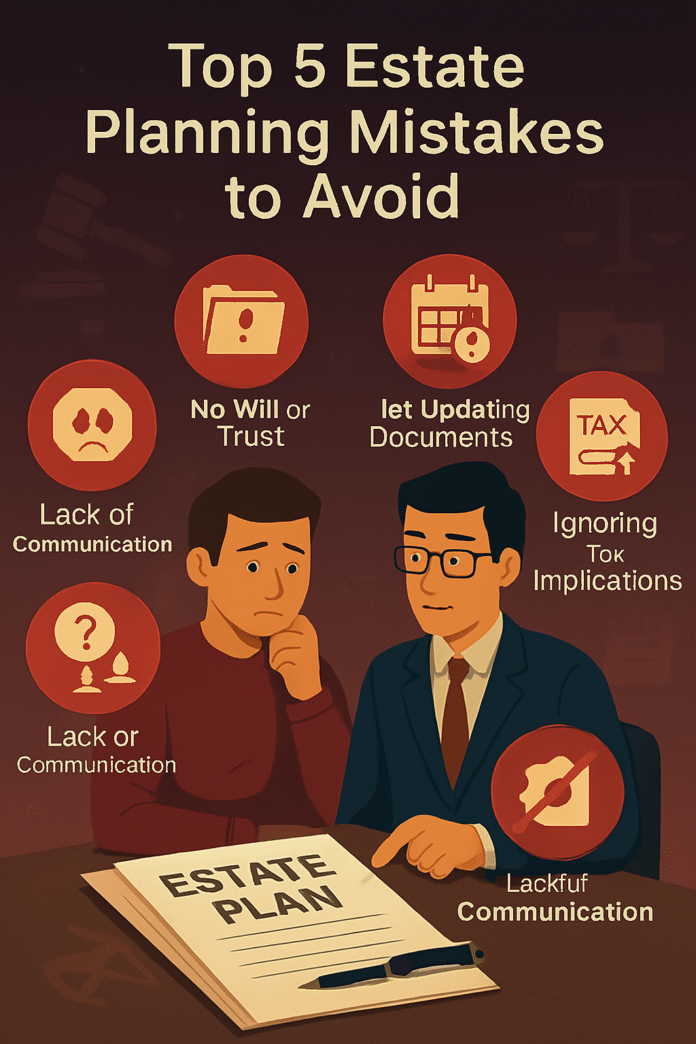Making a will or setting up a trust is only one part of estate planning. It’s a very important way to plan for the future, protect your hard-earned money, and make sure your wishes are carried out after you die. For a lot of people, just thinking about estate planning can make them feel uneasy or put it off. But making a complete estate plan is important not only for keeping your wealth but also for keeping your loved ones from fighting and avoiding expensive legal or tax problems in the future.
A well-thought-out estate plan can help your family’s finances in today’s unstable economy. Estate planning is a proactive way to make sure that your legacy stays intact, whether you own a business, have a lot of assets, or just want to know that everything will be taken care of properly. If you don’t plan ahead, your assets might not be distributed the way you want them to be, which could cause your family to face delays, high taxes, or even bitter legal battles. If you don’t have a clear plan, state laws will decide how your wealth is divided, which can be bad for people and families who don’t want to go along with those default paths.
This article goes into great detail about the five most common estate planning mistakes that people make. You’ll get a better understanding of problems like putting things off, using old documents, tax problems, poorly managed trusts, and not keeping track of digital assets. If you learn how to avoid these common mistakes when planning your estate, you’ll not only save money and stress, but you’ll also make sure that every part of your legacy is handled with care and accuracy. We encourage you to use the practical tips in this guide to make an estate plan that really shows what you want and protects your loved ones now and in the future.
This conversation has naturally included keywords like “estate planning mistakes,” “common estate planning errors,” “how to avoid estate planning mistakes,” “estate planning tips,” “trusts and wills mistakes,” and “updating estate plans” to help you find the most useful information and make the most of your online search. Let’s look at these problems one at a time, with full explanations, helpful tips, and pictures to help you understand how to deal with the difficulties of estate planning.
Mistake #1: Not Having an Estate Plan
A lot of people put off planning their estates because they think it’s only necessary for rich people or people with complicated assets. But putting things off is by far the most common and dangerous mistake. If you don’t have an estate plan in place, like a simple will, trust, or healthcare directive, things can get complicated when you need your wishes to be followed the most.
The Risks of Dying Without a Will
When someone dies without a will, which is called dying intestate, the state’s default laws take over. These laws often divide up property in ways that don’t match what you want. For example, if you have blended families or relatives you don’t talk to anymore, your assets could be split up in a way that leads to family fights, legal battles, or long court cases. In some cases, families may have to wait a long time to get their assets because courts have to figure out who the rightful heirs are.
For example, think about a family where the father died without leaving a will. The state’s intestacy laws automatically gave his next of kin his assets based on the law, not his own wishes. This choice caused long court battles, higher legal fees, and family problems that could have been avoided with simple, proactive planning.
How to Avoid This Common Mistake in Estate Planning
If you haven’t started planning your estate yet, the first thing you should do is start now. You can:
- Get Professional Help: Hire an estate planning lawyer or a financial planner who knows a lot about estates. These experts can give you advice that is specific to your needs.
- Use DIY Tools: If your estate isn’t too complicated, you can use trustworthy online tools to write a simple will or make power-of-attorney documents. These tools are a good place to start, but keep in mind that you may need to get professional help for complicated situations.
- Learn: Knowing even the basics of estate planning can help you ask the right questions and make smart choices. You might want to go to workshops or webinars that make estate planning easier to understand.
If you don’t do something today, your assets and your family’s financial well-being may be left up to state laws instead of your carefully thought-out wishes. Keep in mind that estate planning is a way to take care of yourself and be responsible. It’s not just for people with a lot of money; it’s something everyone should do if they want to protect their legacy and make things clear for their loved ones.
Checklist of Things to Do:
- Make an appointment with a lawyer who specializes in estate planning.
- Look online for tools that can help you make a will.
- Make a list of all your major assets and possible heirs.
- Write up initial documents and make a schedule for review.
These first steps may seem hard, but they are the best way to avoid the expensive and painful problems that come with dying without a will. You can make sure that your legacy is set in stone on your own terms by acting now instead of leaving it to chance.
Mistake #2: Not Keeping Your Estate Plan Up to Date
A lot of people think that once they have an estate plan, they can just put it away and forget about it. But life is anything but still. Big life events, like getting married, getting divorced, having a baby, losing a loved one, or even changing jobs, can have a big effect on your finances. Not updating your estate plan after these changes is a common mistake that can have big effects.
Life Changes Require New Documents
Your family situation or what you want may have changed since you signed those legal papers five or ten years ago. If you’ve gotten married again, for instance, your old will might accidentally help your ex-spouse. Or maybe a beneficiary you named in your estate plan has died, which means that your plan for how to divide your assets is no longer valid.
Example from the Real World:
Think about a person who is retired and wrote their estate plan years ago. Their kids have grown up since then, and they now have a few grandchildren. If you don’t have an updated plan, family members might not know who should get what or even fight over it. In very bad cases, these kinds of mistakes have led to long probate processes and family lawsuits that took money from the estate.
Why Regular Reviews Are Important
You can’t just “set it and forget it” when it comes to estate planning. Instead, you need to review your documents from time to time to make sure they still reflect your changing life situations. Experts say that you should look over your estate plan every three to five years, or right after a big life event.
How to Keep Your Estate Plan Up to Date:
- Set up calendar reminders: Set reminders for once a year to see if you need to make changes or review your work.
- Keep an Up-to-Date Asset Inventory: Make a list of all your important assets, such as your bank accounts, investments, and real estate.
- Talk to Your Family: Having regular family meetings can help make sure that everyone knows about your current estate plans and any changes that are coming up.
- Work with professionals: Hire an estate planning lawyer to review your plans on a regular basis, make sure they are up to date, and make sure they follow any changes in the law.
Things That Can Help
There are a number of modern tools that can help you keep your estate plan up to date:
- Digital calendars and reminder apps: Set up reminders that happen on a regular basis for reviews.
- Estate Planning Platforms: Some online services will send you alerts when important life events happen.
- Checklists: Use a full checklist to regularly review every part of your estate plan.
Updating your estate plan on a regular basis is more than just a legal requirement; it’s a way to make sure that your wishes are always followed, even if your life changes. You can keep your estate plan as flexible as your life by making sure to plan ahead and review it every now and then.
Mistake #3: Not Thinking About Taxes and Estate Taxes
One of the hardest but most important parts of estate planning is knowing and getting ready for the tax consequences. A lot of people don’t realize how much federal and state estate taxes can eat away at their wealth, or worse, they don’t plan for how to lower these tax burdens. Ignoring this fact is a common mistake people make when planning their estates, and it can cost them a lot of money.
How to Understand Estate Taxes
When someone dies and their assets are passed on, they have to pay estate taxes. Many people think that estate taxes only affect the very rich, but this isn’t always the case, especially when state tax laws are involved. The federal estate tax exemption threshold may be high, but state taxes can kick in at much lower asset values. If you don’t understand these rules, your heirs might have to pay a lot of taxes while the probate process is going on.
Common Mistakes
People often think that as long as they stay below the federal limit, they’re safe. But state taxes and other tax obligations, like generation-skipping transfer taxes, can still affect your estate. Also, without the right plans, estates that are below these thresholds may still have to pay more taxes because they missed chances to plan for taxes.
Ways to Lower Your Tax Burden
To protect your assets, think about adding these ideas to your estate plan:
- Use Trusts: Trusts can be a good way to handle and lower your tax bills. For instance, revocable living trusts can not only make the probate process easier, but they may also give you chances to plan your taxes.
- Giving While You’re Alive: Think about ways to give that will lower the value of your taxable estate. Gifts that fall under the annual exclusion can slowly move wealth while also getting tax breaks.
- Giving to charity: Giving to charity not only helps causes you care about, but it can also give you big tax breaks that lower the total taxable value of your estate.
- Family Limited Partnerships: These types of businesses can help combine family-owned assets and maybe even lower taxes by changing who owns and controls them.
A Table of Possible Federal and State Tax Limits
Here is a sample table that shows how different federal and state tax thresholds could affect your tax obligations:
| Jurisdiction | Estate Tax Exemption Threshold | Estimated Tax Rate |
|---|---|---|
| Federal | $12.92 million (2023)* | Up to 40% on amounts over threshold |
| State A | $2 million | 10%–20% |
| State B | $1 million | 15%–25% |
| State C | $5 million | 5%–15% |
*Note: The federal threshold can change, and state thresholds are very different from each other.
Working with Experts
Estate tax laws are complicated and change often, so it’s important to work with tax professionals and estate lawyers who have a lot of experience. These experts can make plans that work for you and help you take advantage of every tax-saving opportunity that comes your way. If you don’t think about these tax consequences, your heirs could end up with a lot less than you planned. The cost is so high that even small mistakes can have long-lasting effects.
Final Thoughts on Taxes on Estates
Estate planning is not only about how to divide up your assets; it’s also about keeping your wealth. You can help make sure that your financial legacy lasts for generations by understanding and dealing with the tax consequences ahead of time. A well-planned estate lowers your tax burden and increases the benefits that go to your heirs. This proactive approach is an important part of responsible estate planning. It makes sure that your wishes are carried out without too much government interference.
Mistake #4: Not Giving Trusts Enough Money
People often say that setting up a trust is one of the best things you can do for your estate. Trusts make it easy to move assets around, avoid the long probate process, and add extra layers of protection for those assets. But just making a trust isn’t enough; it’s very important to fund it correctly. If you don’t put your assets into the trust, it won’t work, which could lead to the problems you were trying to avoid in the first place.
What Does It Mean to “Fund a Trust”?
When you fund a trust, you change the legal title of your assets from your name to the name of the trust. Your assets will still have to go through probate and could be the subject of disputes if you don’t make this transfer. If you want to protect your real estate, bank accounts, investments, or business interests with a trust, you need to formally retitle each of these assets.
In the Real World:
Think of a business owner who carefully set up a trust to protect his family’s future. But he forgot to put his main investments and property into the trust. When it was time to transfer ownership, the assets went straight to the heirs without going through the trust. This took a long time and greatly lowered the total value available to his heirs.
How to Fund a Trust in Steps
This is how you can be sure that your trust has enough money:
- Make a list of your assets: Make a complete list of all the things you want to put in the trust, such as real estate, bank accounts, stocks, bonds, and personal property.
- Look over the Trust Papers: To know which assets should be included and how to transfer them, read the trust’s terms and conditions very carefully.
- Change the names of the assets: Call banks, title companies, and insurance companies to update the records of who owns what. In the case of real estate, this could mean writing down a new deed that lists the trust as the owner.
- Talk to Experts: Talk to your estate planning lawyer to make sure that all of your assets are transferred correctly. This step is very important for complicated assets like business interests or retirement accounts.
- Keep Records: Keep detailed records of all changes and transfers. This paperwork could be very helpful if you have any questions during a tax audit or probate later.
Checklist for Trust Funding
Here is a short list to help you make sure you have done everything you need to do:
- Make a list of all important assets
- Read and understand the trust document
- Get in touch with institutions to change the names of assets
- Set up a meeting with a lawyer who specializes in estate planning
- Keep detailed records of all transfers of assets
The Bottom Line
Having a trust that isn’t funded or is poorly funded is like having a perfect plan that never gets put into action. If you take the time to properly fund your trust, you can be sure that the benefits it was meant to provide, such as avoiding probate and lowering taxes, will be fully realized. Not only does this step protect your assets, but it also makes sure that your legacy is exactly how you wanted it to be.
Mistake #5: Not Paying Attention to Digital Assets and Beneficiary Designations
Estate planning these days isn’t just about things like real estate and bank accounts anymore. Digital assets, like social media accounts, digital photos, online bank accounts, and cryptocurrency, are becoming a bigger and bigger part of your legacy. Not keeping track of these digital assets and not making sure that the right people are named as beneficiaries on accounts like retirement plans and life insurance policies are two common but often ignored mistakes in estate planning.
Why Digital Assets Are Important
Digital assets are different from other types of assets because service providers often make their own rules about who can access and transfer them after death. If you don’t give clear instructions in your estate plan, your heirs might not be able to get to these important digital files. Also, important accounts with stored financial information, emails, or even digital business ventures might not be accessible, and this mistake could cause a lot of pain during an already hard time.
Why Beneficiary Designations Are Important
Beneficiary designations tell you who will get the money in your retirement accounts, life insurance policies, and bank accounts that are payable on death. If you have an old or wrong designation, your assets might go to the wrong people. These assets need to be carefully managed all the time because they often pass outside of the probate process.
How to Protect Digital Assets and Change Beneficiary Information
How to Protect Your Digital Legacy:
- Make a list of your digital assets: Make a list of all of your digital assets, like your online accounts, social media accounts, cryptocurrency wallets, and even your digital subscriptions.
- Choose a Digital Executor: After you die, have someone you trust take care of your digital assets and accounts. Make sure this person has the legal power they need.
- Add Digital Asset Provisions to Your Estate Plan: In your will or trust, say how digital assets should be accessed and shared.
- Go over and change the beneficiary forms: Make sure that the current form reflects your wishes by checking the beneficiary designations on all of your accounts, especially after big life events like getting married, getting divorced, or having a baby.
A Useful List for Digital Assets and Naming Beneficiaries
- Make a list of all your long-term digital assets.
- Choose a digital executor you can trust.
- Change the beneficiary forms for all accounts that need them.
- In estate documents, include clear instructions for digital assets.
- Set up regular reviews to make sure all the information is up to date.
The Bigger Picture
If you don’t include digital assets and beneficiary designations, it can be very hard for your heirs. These mistakes can turn what should be a smooth transfer of your legacy into a huge administrative headache, whether it’s delayed access, sending it to the wrong people, or losing important personal information. Adding digital assets and carefully reviewing beneficiary designations are two important steps you can take to update your estate plan and protect your entire financial and personal legacy.
Extra Tips for Making Your Estate Planning Work
There are even more things you can do to make sure your estate plan is bulletproof than the five big ones we’ve already talked about. Here are some extra tips that can help you improve your planning even more and stay away from problems:
Tell People What You Want
- Talk about things with your family: Talk honestly with your family about your estate plan. This openness can help stop problems and misunderstandings from happening in the future.
- Write down your choices: In addition to legal papers, keep a personal letter or video message explaining why you made certain choices. This context can be very helpful when things are going wrong.
Choose the Right Executors and Trustees
- Smart Choice: Pick an executor or trustee who is organized, fair, and able to handle complicated financial issues.
- Oversight by someone else: Hiring an outside professional as an executor or trustee can sometimes help avoid conflicts of interest and make sure that future decisions are made fairly.
Think About Your Guardianship Options
If you have young kids, it’s very important to choose a guardian. This choice not only protects your child’s future, but it also makes things less uncertain during times of crisis.
Use Professional Advice
- Get experts involved early: Getting advice from estate planning lawyers, tax professionals, and financial planners can help you make your plan fit with the constantly changing legal and financial world.
- Put money into what matters: DIY estate planning tools can be helpful, but when things get complicated, it’s often best to get help from experienced professionals who can make a plan just for you.
Use Technology
Choose estate planning software that lets you store documents in the cloud, reminds you to review them every so often, and makes it easy to change beneficiary information. Not only does this make your approach more modern, but it also makes sure that your documents are always up to date and easy to find.
A Quick Review of the Estate Planning Checklist
- Clearly state what you want and write down why you want it.
- Choose executors or trustees who are honest and capable
- Choose guardians for kids under 18
- Use the knowledge of professionals for hard problems
- Use digital tools to keep your documents up to date and modern.
You can make your estate planning more complete and flexible by adding these extra steps to your overall plan. This all-encompassing method protects not only your money but also the emotional health of your loved ones during tough times.
Debunking Common Estate Planning Myths
There are a lot of myths and misunderstandings about estate planning, and a lot of people don’t make solid plans because of wrong information. By getting rid of these myths, you can take clear, measured steps to protect your legacy.
Myth 1: Only Rich People Need an Estate Plan
People often think that only very rich people need to plan their estates. In fact, everyone, no matter how much money they have, benefits from having clear rules in place. A simple estate plan helps make sure that your wishes are followed, keeps family relationships strong, and makes it easier to manage even small amounts of money.
Myth 2: A Will Keeps You Out of Probate
A will is an important part of an estate plan, but it doesn’t automatically avoid probate. Probate is the court process that checks a will and makes sure that assets are divided up fairly. Many assets still go through probate if they don’t have extra planning tools like properly funded trusts or joint ownership structures.
Myth 3: An Estate Plan Doesn’t Need to Change Once It’s Written Down
Some people think that planning your estate is something you only have to do once. But an estate plan that doesn’t change can become out of date as laws and personal situations change. To make sure that your plan is up to date with your current situation, you need to review and update it regularly.
Myth 4: Planning Your Own Estate Is Always Enough
Online tools and templates can help you make a basic estate plan, but they might not be enough if your estate is complicated or your family situation is unusual. Custom legal advice can help you deal with situations that standard forms might not cover, making sure that your plan can handle any legal, financial, or family issues that come up.
A Quick Summary of the Myth Buster:
- Myth: Estate planning is only for rich people In reality: Everyone benefits from protecting their legacy.
- Myth: A will keeps you out of probate completely Truth: You need more tools to completely avoid probate.
- False: Estate plans never need to be changed Truth: Life changes need to be looked at often.
- Myth: Plans you make yourself are always enough Truth: For complicated estates, professional help is priceless.
You can make your estate planning more honest and useful by recognizing these myths and concentrating on facts and useful information.
Questions and Answers (FAQs)
Many people have important questions when it comes to estate planning because it can be so complicated. We answer some of the most common questions about estate planning mistakes and best practices below.
How often should I make changes to my estate plan?
- Answer: You should look over your estate plan every three to five years or right after something big happens in your life, like getting married, getting divorced, having a child, or making big changes to your finances. Regular updates make sure that your document still reflects what you want.
What Happens If I Don’t Make a Will?
- Answer: If you die without a will, state laws will decide how to divide your assets. If you don’t do this, your family may fight over your assets, the probate process may take longer, and people who don’t want your assets may end up with them. To make sure your wishes are followed, you need to make a clear estate plan.
Can I Make My Own Will?
- Answer: You can make a simple will using a reliable online service or a do-it-yourself template, but if your estate is complicated, you should talk to a lawyer. Legal oversight can help keep things from getting out of hand and make sure that state laws are followed.
What kinds of property should I put in a trust?
- Answer: Real estate, bank accounts, investment portfolios, and business interests are all common assets that can be put into a trust. A trust that is properly funded can make it easier to divide up assets and help you avoid probate. Talk to your estate planning lawyer about your specific asset portfolio for personalized advice.
How do I pick an executor?
- Answer: Pick an executor who is organized, trustworthy, and able to make tough financial decisions even when things are stressful. If family members don’t want to or can’t be executors, a lot of people choose to hire professionals.
Conclusion
In short, good estate planning can mean the difference between leaving your family a legacy that protects their future and a long, expensive legal battle. Not making an estate plan, not updating documents after life changes, not thinking about taxes, not properly funding trusts, and not thinking about digital assets and beneficiary designations are the five most common estate planning mistakes. These mistakes show how important it is to take all the necessary steps to protect your assets.
Each of these mistakes could have serious financial and emotional effects. Avoiding these mistakes is very important because dying without a will can cause delays and disputes, and complicated tax situations can eat away at your hard-earned money. You can make sure that your estate is handled the way you want it to be by staying informed, talking to professionals, and reviewing your plans from time to time.
It’s time to do something now. First, look over your current estate planning documents and fill in any holes in your plan. Then, think about getting professional help to make a plan that fits your changing needs. Download our free estate planning checklist or set up a meeting with an experienced estate planning lawyer to get started. Join the growing number of people who have taken charge of their legacies.
Planning your estate is more than just making legal arrangements; it’s a way to show your loved ones that you care and to leave them a final message about your values and priorities. By following these expert tips and avoiding these common mistakes, you are making a better future for everyone you care about and giving yourself more peace of mind.
More Reading and Final Thoughts
Estate planning is a complicated field that changes as your life does. We talked about the five most common mistakes people make when planning their estates and gave practical advice on how to avoid them. We also included extra tips and busted some myths. As you work on a full plan, you might want to read more about things like advanced trust strategies, giving to charity through estates, and estate planning for business owners.
If you want more detailed checklists, charts showing tax thresholds, and in-depth FAQs on certain planning situations, we encourage you to look at our related articles and downloadable resources. Keep in mind that good estate planning isn’t something you do once and forget about; it’s something you do over and over again as your life changes. Today is the day to start planning. It’s one of the best things you can do for your future generations.
If you follow the advice and steps in this article, you’ll be less likely to make common mistakes that could get in the way of your estate planning goals. If you’re just starting the process or looking over an old plan, the information here will help you make sure your legacy is safe and your loved ones are safe for a long time to come.






Awesome article. very helpful